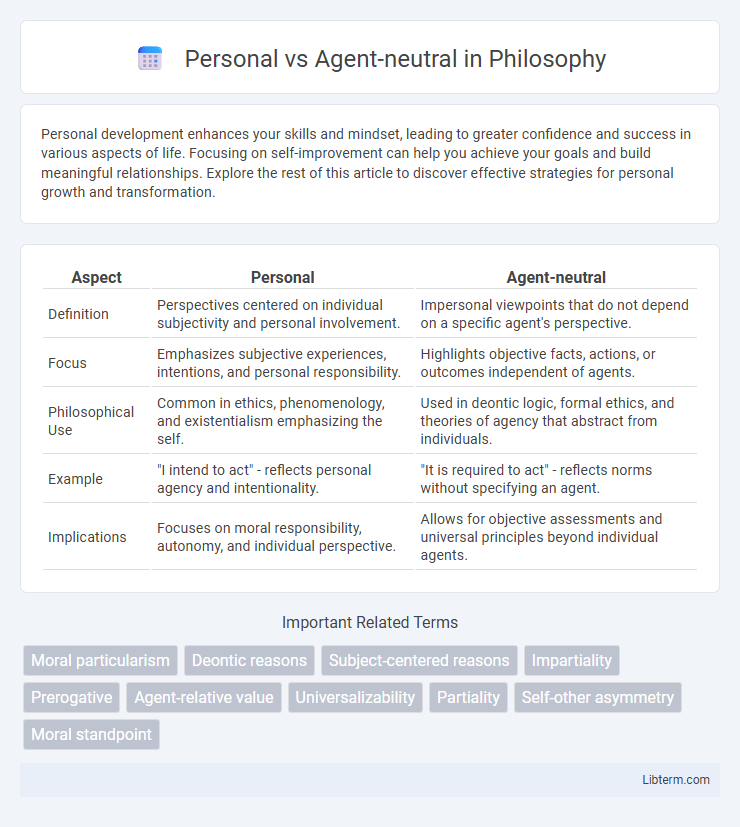Personal development enhances your skills and mindset, leading to greater confidence and success in various aspects of life. Focusing on self-improvement can help you achieve your goals and build meaningful relationships. Explore the rest of this article to discover effective strategies for personal growth and transformation.
Table of Comparison
| Aspect | Personal | Agent-neutral |
|---|---|---|
| Definition | Perspectives centered on individual subjectivity and personal involvement. | Impersonal viewpoints that do not depend on a specific agent's perspective. |
| Focus | Emphasizes subjective experiences, intentions, and personal responsibility. | Highlights objective facts, actions, or outcomes independent of agents. |
| Philosophical Use | Common in ethics, phenomenology, and existentialism emphasizing the self. | Used in deontic logic, formal ethics, and theories of agency that abstract from individuals. |
| Example | "I intend to act" - reflects personal agency and intentionality. | "It is required to act" - reflects norms without specifying an agent. |
| Implications | Focuses on moral responsibility, autonomy, and individual perspective. | Allows for objective assessments and universal principles beyond individual agents. |
Understanding Personal and Agent-Neutral Perspectives
Personal perspectives emphasize individual experiences, emotions, and subjective viewpoints, offering a unique and intimate understanding of situations. Agent-neutral perspectives prioritize objectivity by abstracting away personal biases and focusing on general principles or systemic factors. Understanding both approaches enables more balanced analysis by integrating personal nuances with impartial evaluation.
Defining Personal Reasons and Motivations
Personal reasons and motivations refer to the unique, individual factors that drive a person's decisions and behaviors, shaped by their experiences, emotions, and values. These reasons are subjective and deeply tied to one's identity, contrasting with agent-neutral perspectives that emphasize impartial, generalized factors influencing actions. Understanding personal motivations involves analyzing intrinsic desires, goals, and psychological states specific to the individual agent.
What Does Agent-Neutrality Mean?
Agent-neutrality refers to a perspective or policy that avoids assigning responsibility or credit to any specific individual or group for an action or outcome. It emphasizes impartiality by focusing on the process or system rather than the agents involved. This approach is commonly used in organizational decision-making, conflict resolution, and ethical analysis to ensure fairness and objectivity.
Key Differences Between Personal and Agent-Neutral Approaches
Personal approaches prioritize individual responsibility by emphasizing the agent's intentions, feelings, and choices, often applied in moral psychology and law to assess culpability. Agent-neutral approaches focus on outcomes and principles independent of the agent's identity or motives, commonly used in utilitarian ethics to maximize overall well-being. Key differences lie in accountability attribution, moral evaluation criteria, and applicability across subjective versus objective frameworks.
Philosophical Foundations of Personal Vs Agent-Neutral Ethics
Personal ethics emphasize moral responsibilities and values centered on individual identity, motives, and relationships, grounding ethical decisions in personal commitments and subjective perspectives. Agent-neutral ethics prioritize impartial principles that apply universally, focusing on outcomes or duties independent of individual agents' particular roles or desires. Philosophically, the debate examines whether moral reasons derive from agent-relative attitudes, such as self-interest and personal projects, or from objectively valid norms that hold regardless of who acts.
Real-World Examples: Personal vs Agent-Neutral Decisions
Personal decisions involve direct human judgment and contextual understanding, such as a doctor tailoring treatment plans based on patient history and preferences. Agent-neutral decisions, common in automated systems like AI-driven loan approvals, rely on standardized criteria to ensure fairness and consistency regardless of individual identities. Real-world examples highlight how personalized choices optimize outcomes in healthcare, while agent-neutral approaches enhance objectivity in financial services.
Advantages of a Personal Perspective
A personal perspective enhances empathy and emotional connection by allowing agents to understand customer needs on a deeper level. This approach fosters trust and loyalty, leading to improved customer satisfaction and retention rates. Personalized interactions often result in faster problem resolution and more tailored solutions, optimizing overall service effectiveness.
Benefits of Adopting Agent-Neutral Reasoning
Agent-neutral reasoning improves objectivity by focusing on outcomes rather than individual intentions, enhancing fairness in ethical decision-making. This approach supports consistent policy development and automated systems by reducing bias linked to personal perspectives. Emphasizing universal principles over personal views fosters clear, replicable reasoning adaptable across diverse contexts.
Debates and Criticisms: Which Perspective is Better?
The debate between personal and agent-neutral perspectives centers on moral responsibility and ethical evaluation, with critics arguing that personal views emphasize individual accountability while agent-neutral approaches prioritize impartial principles. Philosophers like Thomas Nagel and Derek Parfit highlight the strengths of agent-neutrality in promoting fairness and universality, whereas defenders of personal perspectives stress the importance of subjective experiences and relational contexts. This ongoing discourse shapes ethical theory by challenging how moral reasons are justified and applied across diverse situations.
Practical Implications for Everyday Decision-Making
Personal decision-making centers on individual preferences, emotions, and immediate context, shaping choices based on unique values and experiences. Agent-neutral approaches prioritize impartiality by considering universal principles and collective outcomes, often beneficial in ethical dilemmas and policy development. Balancing personal insights with agent-neutral frameworks enhances practical decision-making by integrating subjective desires with objective fairness.
Personal Infographic

 libterm.com
libterm.com